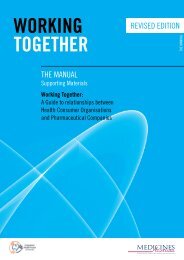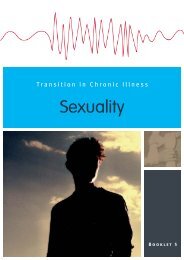Transition in Chronic Illness - Understanding Transition
Transition in Chronic Illness - Understanding Transition
Transition in Chronic Illness - Understanding Transition
- No tags were found...
You also want an ePaper? Increase the reach of your titles
YUMPU automatically turns print PDFs into web optimized ePapers that Google loves.
Liv<strong>in</strong>g with chronic illness br<strong>in</strong>gs many life issues to the fore. One of the primary experiences for ushas been the realisation that our lives have changed, often permanently. <strong>Illness</strong> has disrupted ourfuture plans. It has troubled our partners, family and friends when they realise the way <strong>in</strong> whichillness has <strong>in</strong>truded on our collective lives. However, we are learn<strong>in</strong>g to deal with the many changesthat the illness has bought to our lives.Over time, we have come to realise that although there are differences among us, there areexperiences <strong>in</strong> common too. Some of these experiences, such as pa<strong>in</strong> or isolation, have made usfeel alone <strong>in</strong> the past. We have learnt the value of hear<strong>in</strong>g the ideas and perspectives of otherpeople <strong>in</strong> similar situations, so we have worked together to develop this series of ten booklets. Notall of the people <strong>in</strong> this project have been able to contribute to the booklets. Rather, a group ofeleven people has been consistently <strong>in</strong>volved.About The BookletsWe decided to share our experiences <strong>in</strong> a series of eleven booklets. The purpose of these bookletsis to share some of our conversations about many <strong>in</strong>terest<strong>in</strong>g and difficult aspects of liv<strong>in</strong>g withillness. Our conversations have been a safe place where we can seek understand<strong>in</strong>g and supportas we tackle the issues that confront us physically, emotionally, socially and spiritually. We aresupport<strong>in</strong>g each other by shar<strong>in</strong>g <strong>in</strong>formation, emotional comfort and friendship. In these bookletswe share our discussions.The booklets are set out <strong>in</strong> question and answer format, and are <strong>in</strong>tended to connect you with ourvoices about our experience of liv<strong>in</strong>g with long term illness. There are no right or wrong answers tothese questions. Our answers reflect our current th<strong>in</strong>k<strong>in</strong>g and understand<strong>in</strong>g about what it meansto live with long term illness. Maybe you will f<strong>in</strong>d some experiences and ideas that are familiar toyou or have mean<strong>in</strong>g <strong>in</strong> the context of your life. We acknowledge that challenges are part of life andfall with<strong>in</strong> the experience of all human be<strong>in</strong>gs. Given this, our experiences may also be helpful topeople liv<strong>in</strong>g without illness.About The Research InquiryA three year research grant (2003-2006) from the Australian Research Council (ARC) was awardedto our research team. This was a collaborative project between The University of South Australiaand the Research Unit, Royal District Nurs<strong>in</strong>g Service. The <strong>in</strong>vestigators are Professor T<strong>in</strong>a Koch,Dr Debbie Kralik and Dr Kay Price. Project Management Members are Kerry Telford, Professor JimWarren, G<strong>in</strong>o Pignone and Natalie Howard.22<strong>Transition</strong> <strong>in</strong> <strong>Chronic</strong> <strong>Illness</strong> | Booklet 11 | Understand<strong>in</strong>g <strong>Transition</strong>















